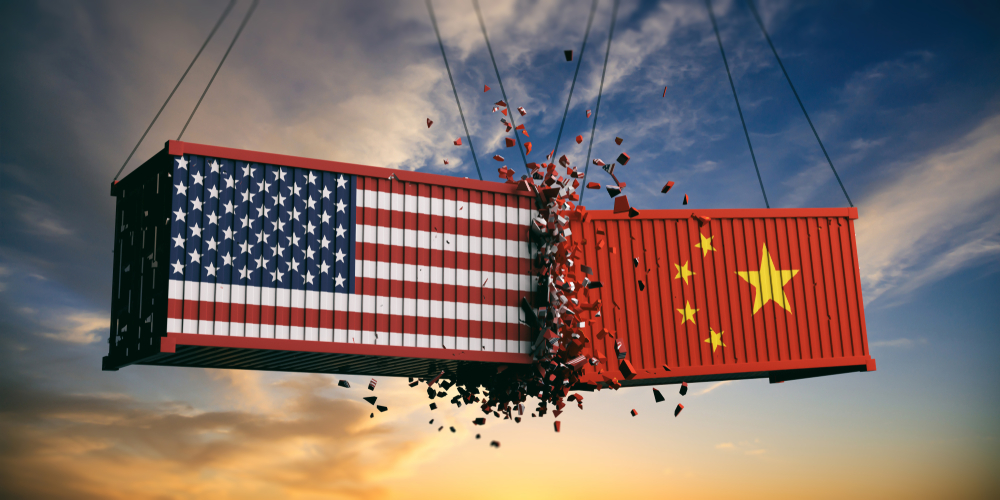The U.S.-China Trade War: Alumni Learning Series

October 3, 2019
Professors Vikas Anand, Executive Director of the MBA programs and Professor of Management, Raja Kali, Department Chair and Professor of Economics, and Difei Geng, Assistant Professor of Economics, hosted this month’s Walton Alumni Learning Series on the U.S. and China Trade War. Topics included the economic environment that precipitated the dispute and the effects on the U.S. and Chinese economies, both nationally and internationally.
What led to the Trade Dispute?
There have been long-standing tensions in the trading relationship between the countries that have finally boiled over. Issues relating to the weak intellectual property protection, forced technology transfers for US companies as a price for competing in the Chinese market, and restrictions on market access, such as for financial firms have been simmering for a while.
Professor Kali believes some of the factors described above have created conditions under which Chinese companies have been able to emerge as domestic competitors, with the propensity to become international competitors—a major concern for U.S. companies.
China’s new industrial policy only added fuel to the fire. Implemented in 2015, “Made in China 2025” is an industrial policy that seeks to buy-in on high tech industries, such as AI and machine learning. While the Chinese government promulgates the policy as a fair and just act towards economic security, and a way to avoid the “middle-income trap", the United States has taken a defensive approach that views the policy as creating unfair economic competition.
China’s Response
Professor Geng reminded the audience that the trade dispute is not a one-sided battle. While the United States has accused China of intellectual property theft, unjust forced technology transfers, and the creation of an unfair economic advantage, China has expressed their own grievances on the economic relationship between the two countries. Beyond the recent implementation of tariffs on Chinese goods, and the Chinese retaliation tariffs that ensued, China has also criticized the U.S. for its unilateralism in recent years. Professor Geng presented an alternative narrative:
“The argument here is that the U.S. has played a leading role in the building of institutions of international trade, such as the World Trade Organization. However, recently, the U.S. has decided to go around the World Trade Organization to address the issues with China [directly].”
The Trade War and the U.S. Economy
| YouTube or Vimeo embed link. |
|---|
| //www.youtube.com/embed/W6cHyYrK0CE?rel=0 |
PRESS ENTER HERE FOR A NEW LINE->
Dr. Kali examined the direct and indirect consequences of the U.S-China trade war on the U.S. economy. There have been direct, negative impacts on U.S. agriculture and manufacturing sectors, as well as consumer goods. Tariffs on soybeans and pork (China is the largest market for soybeans and the world’s largest pork consumer) have had an observable effect on U.S. farmers. The manufacturing sector, a major importer of Chinese intermediate goods, will also sustain higher manufacturing costs. However, Dr. Kali believes it is the “average consumer” that will suffer most:
“There will be higher prices of U.S. manufactured goods due to their higher costs, and the Chinese imported goods will also increase in price due to the first round of tariffs. Refrigerator prices have already gone up, and prices of TVs and computers will likely go up after the holiday season."
The Trade War and the Chinese Economy
The trade war has created a dangerous atmosphere of uncertainty for U.S. businesses. An inability to plan, invest, and hire due to uncertainty in the market is confounded by a steady stream of policy changes. Professor Kali believes there may be long-term consequences for the U.S. economy.
“China has already lost about 2 million jobs due to the trade war with the U.S. If this war continues, China will likely face serious unemployment problems.”
Tariffs are a double-edged sword in the U.S.-China trade war, and no one seems to be winning.
| YouTube or Vimeo embed link. |
|---|
| //www.youtube.com/embed/Yt9mfzFOEo8?rel=0 |
PRESS ENTER HERE FOR A NEW LINE->
Relationships with International Companies
Damaged relations between the United States and China are also expected to have an impact on their relationships with international companies. While there are indirect and direct consequences for both the United States and China, Kali and Geng believe China has the most to lose. A decrease in foreign direct investments and an increase in outsourcing is likely; however, it is unlikely that lost firms will relocate to the United States. Professor Geng comments:
“The U.S. labor cost today is still much higher than other countries. It’s probable these firms will move to other low wage countries like Vietnam or the Philippines.”
An inability to respond to the changing political and economic environment has affected several large companies, including Apple. Apple has “invested heavily in its global supply chain and relies on their operations in China. It’s not easy to reorganize a global supply chain on short notice.” These complex supply chains require years of relationship building and maintenance with heavy investments.
Many companies have taken a “wait-and-see approach” and have put plans for further expansion and investment on hold during this time of uncertainty in the U.S.-China Trade War. The lasting effects of the U.S. and China trade war are unknown, but the expected trajectory does not look promising for either country.
Watch the full discussion:
| YouTube or Vimeo embed link. |
|---|
| //www.youtube.com/embed/OiEGoqoea-c?rel=0 |
